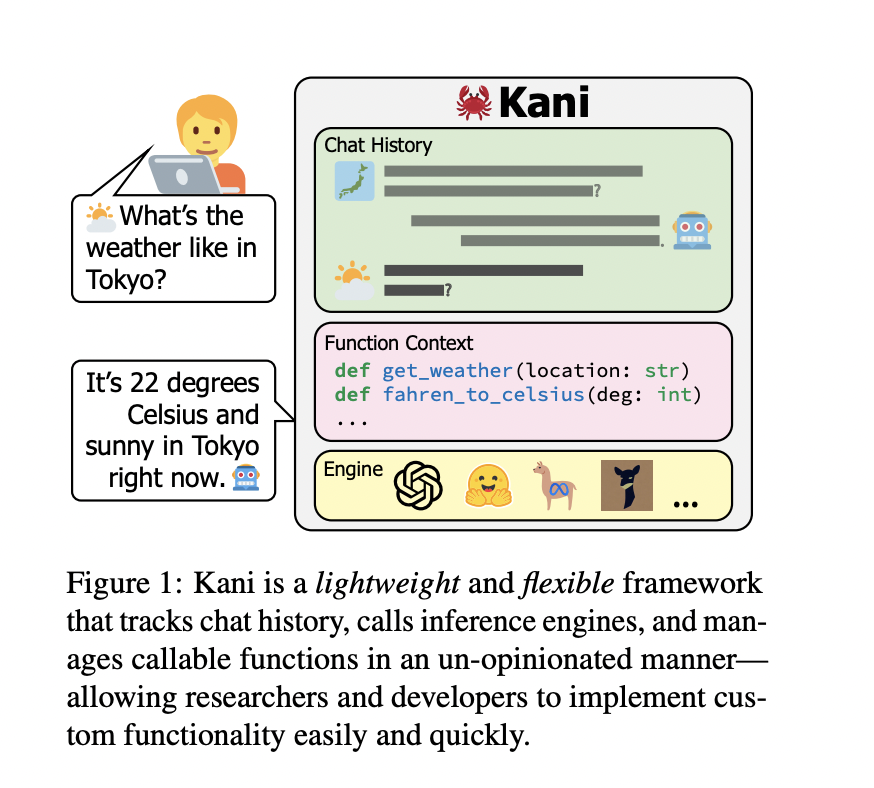Researchers from the University of Pennsylvania Introduce Kani: A Lightweight, Flexible, and Model-Agnostic Open-Source AI Framework for Building Language Model Applications

Large Language model applications have witnessed a surge in popularity. With their amazing capabilities, they are becoming increasingly sophisticated. By incorporating features like tool usage tracking and retrieval augmentation, these models are seeking a lot of attention in the Artificial Intelligence community. The existing frameworks for building such applications take an opinionated approach by dictating to the developers how they should format their prompts and impose certain limitations on customization and reproducibility.
To address these issues, a team of researchers from the University of Pennsylvania has recently introduced Kani, a lightweight, extensible, and model-neutral open-source framework designed specifically for building language model applications. By offering support for the core elements of chat interaction, Kani has been built with the aim of enabling developers to add a wide range of complicated features. Model interaction, chat management, and robust function calling are some of these essential elements.
Developers can create language model applications utilizing Kani’s building blocks without being restricted by predefined structures or limitations, as Kani stands out for its adaptability and customizability. All of Kani’s fundamental features have been created to be easily altered, and the team has provided extensive documentation as well. This allows developers to modify the framework’s functionality to meet their unique demands and requirements.
Kani is a useful tool for a wide range of individuals, including academics, amateurs, and business people. In order to improve the reproducibility of their work, Kani helps researchers create language model applications while enabling fine-grained control. Even with models as powerful as GPT-4 or other complex models, users can use Kani to rapidly get started with designing apps with just a few lines of code. Kani’s versatility and durability are also advantageous to industry workers, especially in areas like chat management and function management.
Kani, requiring Python 3.10+, simplifies language model installation and querying. Installable via pip, it offers core dependencies and optional extras, like the OpenAI engine. The fundamental processing unit in the Kani framework is called a ‘Kani.’ When building applications with Kani, the user will work with and manipulate various Kani objects, which consist of three essential components: inference engine, chat history, and function context.
By means of inference engines, a Kani object communicates with linguistic models. Without changing the application’s code, this interaction enables developers to transition between different models with ease. Kani keeps tabs on the token totals and topic switches. It makes sure that the context of the dialogue stays within the model’s bounds and keeps it from going overboard. Lastly, the language models can access callable functions through Kani. It verifies function calls, runs the appropriate code, and then sends the results back to the inference engine.
In conclusion, Kani has been presented as a solution to the problems faced by language model application developers. It allows for customization, flexibility, and an open-source method of creating incredible applications, as it empowers developers to construct feature-rich apps while maintaining control and interoperability by offering the fundamental building blocks for chat interaction.
Check out the Paper and Github. All Credit For This Research Goes To the Researchers on This Project. Also, don’t forget to join our 30k+ ML SubReddit, 40k+ Facebook Community, Discord Channel, and Email Newsletter, where we share the latest AI research news, cool AI projects, and more.
If you like our work, you will love our newsletter..
Tanya Malhotra is a final year undergrad from the University of Petroleum & Energy Studies, Dehradun, pursuing BTech in Computer Science Engineering with a specialization in Artificial Intelligence and Machine Learning.She is a Data Science enthusiast with good analytical and critical thinking, along with an ardent interest in acquiring new skills, leading groups, and managing work in an organized manner.












